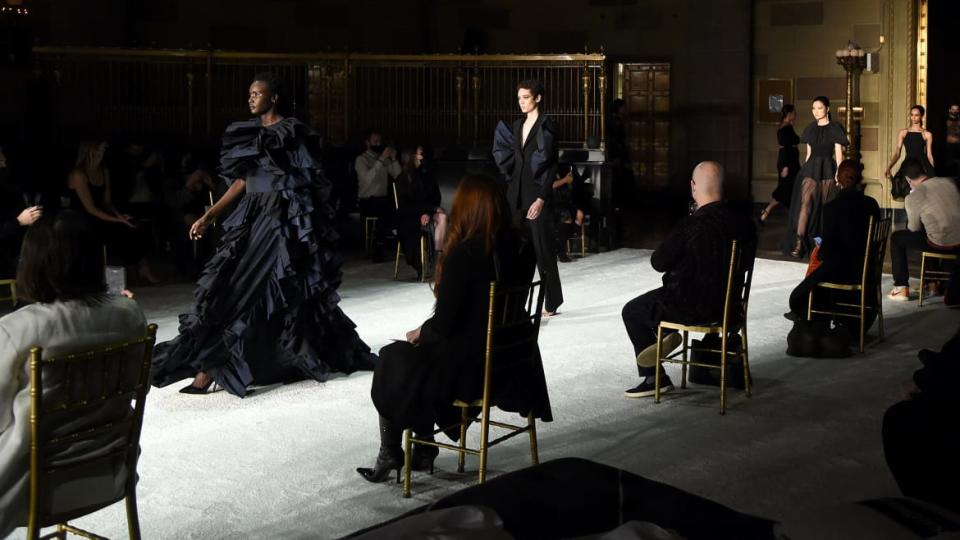COVID Restrictions Are Making New York Fashion Week Very Exclusive

New York Fashion Week organizers often employ a key statistic to justify all the fuss: the biannual event brings 230,000 people to the city and raises $532 million in visitor spending per year. But as the concerns about the ongoing pandemic and Delta surge slash guest lists and gut seating arrangements, this number will surely decline.
Labels like Tom Ford, Jonathan Simkhai, LaQuan Smith, Rodarte, and Christian Cowan have all cited reduced capacity when declining fashionistas who wish to attend their shows. Smith, who will be the first designer to host a runway at the Empire State Building, told WWD that only 150 people have been invited “compared to his typical 350” guests.
New York Fashion Week Is Back, Even if It’s Having an Identity Crisis
“It’s even more important to be exclusive at this time,” he told the trade. “Obviously, from a safety perspective, but also because it’s time to minimize and scale back, zero in on what’s important and eliminate the excess.”
The New York Post reported that “most shows will be between 150 and 200 attendees—instead of the 500-plus audiences from the past—and most of the audience will be composed of industry professionals rather than friends of the designer and fans.”
Lindsey Solomon runs an eponymous fashion and lifestyle communications firm and reps the labels Collina Strada and Sandy Liang. He told The Daily Beast that guest lists for both shows are about one third of what they were pre-pandemic, even with Collina Strada showing outdoors on the Brooklyn Grange rooftop.
“I know everyone who’s meant to be there,” Solomon said. “I think [the capacity limits] gives me the opportunity to say, ‘I’m sorry but who are you?’ And I don’t mean that in a derogatory sense. If you’re meant to be here, you get invited. You don’t get to go to everything. I’m also more firm in saying, you’re going standing [room only].”
In the past, Solomon says he has been more “lenient” with the guest list. “I would throw a bone to a cute influencer or someone who just wants to go to Fashion Week, but [this time] I’ve had to say ‘I’m sorry.’”
Less than 24 hours before the Collina Strada show, which takes place Tuesday at 7pm, Solomon said he’s received “over 200 emails from people who said they forgot to RSVP.”
“It’s too late,” he said. “I have to prioritize timeliness. If you’re RSVPing to me at 12:45 for a 7 o’clock show, to be frank—every request with the exception of one, I’ve had to say, ‘No, I’m sorry. You had three weeks to RSVP.’”
Solomon added, “It’s a hard pill for certain people to swallow, [but] it creates more of an ambience. There are less tent rats and more people who need to be there.”
Tyler McCall, editor-in-chief of Fashionista, agrees that the limited capacity will “inevitably mark a return to more ‘exclusive shows’ than have been the case over the past several years.” But she added another unintended perk: “I think it will help disguise that a lot of international press won’t be at the shows due to COVID restrictions.”
“I’m acutely aware that the pandemic is hardly over and that having a fashion show is definitely not high on the priority list of things that need to get back to ‘normal,’” McCall added. “I get the sense there’s a lot of that awareness and trepidation from folks attending shows this season. It just all feels very ‘Rome is burning.’”
McCall said she does feel “slightly safer” at smaller shows, since it limits the amount of people she could potentially be exposed to. “It’s not a perfect system for sure, but I’d rather be at a show with 100 people than one with 500 crammed elbow to elbow in a small space.”
Get our top stories in your inbox every day. Sign up now!
Daily Beast Membership: Beast Inside goes deeper on the stories that matter to you. Learn more.

 Yahoo Finance
Yahoo Finance 